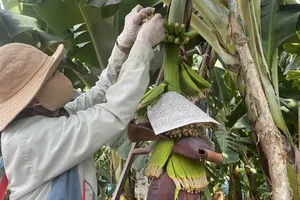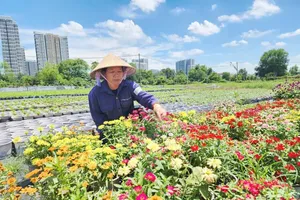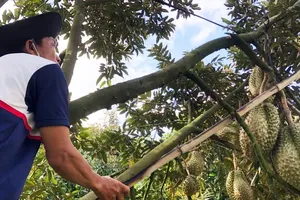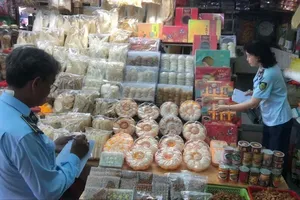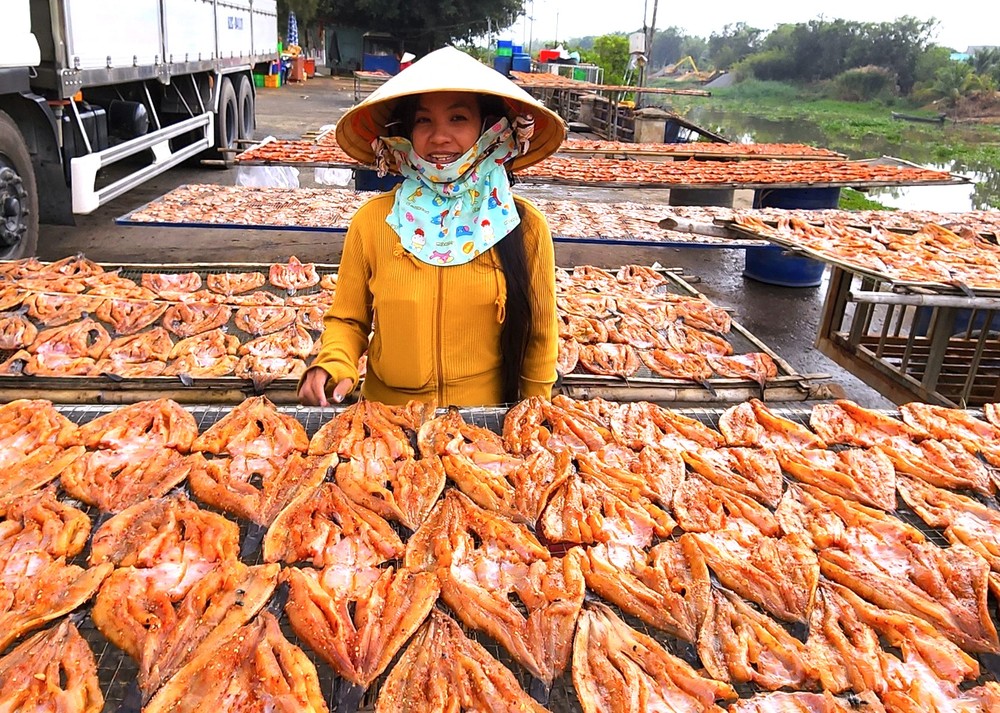
Products with OCOP certification are enjoying smoother consumption, resulting in increased prices.
Bustling craft villages
Currently, farmers and small traders engaged in the dried goods industry in the Dong Thap Muoi (Plain of Reeds) region in Long An Province are actively producing to meet the demands of customers during the 2024 Lunar New Year. The majority of dried products in the localities of Dong Thap Muoi region are predominantly made from freshwater fish, guaranteeing food safety. As a result, these products are recognized and chosen by numerous customers, both within and outside the region.
With more than two decades of commitment to the dried goods industry, Binh Nhung, a farmer in Bau Say market in Vinh Hung District, Long An Province, revealed that, although dried food production takes place throughout the year, the peak of activity occurs during the Tet holiday. During this period, her family procures fish from local residents and hires labor to meticulously clean, cut, and marinate the fish, ensuring they retain a fresh and delightful taste while preserving the inherent flavors of freshwater fish.
"On ordinary days, we typically process between 100kg to 200kg of fish per day, during the Tet holiday, the quantity increases significantly, depending on the orders for gifting. The current selling prices for various dried products range from VND140,000 to VND500,000 per kilogram, depending on the type. Since our main customer base consists of regulars, we have no plans to raise prices during the Tet period. I see this as an opportunity to promote our brand; customers who enjoy our quality fish products will remember our establishment and are likely to return. Therefore, even during the Tet holiday, my business continues selling at regular prices," shared Nhung.
The dried fish craft village of Vam Lang, located in Vam Lang Town, Go Cong Dong District, Tien Giang Province, is also most vibrant at the end of the year. Fishing vessels returning to the shore for the Tet holiday bring with them a substantial amount of raw materials to serve the production of dried fish.
According to Le Van Thanh, the owner of a dried fish production facility in Vam Lang Town, his facility typically sells about 1 ton of finished dried fish per day, primarily serving the Ho Chi Minh City market. He anticipates that this Tet season, the output of dried fish brought to the market will see an increase of approximately 40 percent compared to the previous year. With many units yet to place orders for Tet gift fish, Thanh's facility, along with numerous other dried fish production establishments, has set aside a substantial quantity to cater to local demand and individuals purchasing for the Tet celebration in their hometowns.
The dried fish industry in Vam Lang consumes 5,000 tons of assorted fish annually, amounting to a value surpassing VND50 billion. They distribute 1,500 tons of dried fish to the market. Besides retailing processed dried fish, many households also function as collection points, supplying products to warehouse owners for sale in the Ho Chi Minh City market and nearby provinces.
Likewise, the tofu skin craft village of Dinh Cong Hoang in Binh Minh Town, Vinh Long Province, is experiencing a similar buzz. With the rising consumer demand in the days approaching Tet, the production scale at the tofu skin manufacturing facility has significantly increased. According to the Dinh Cong Hoang tofu skin production facility, while they typically process 75kg of soybeans on regular days, this has now doubled or even tripled.
On average, 75kg of soybeans produces 25kg of finished tofu skin. Currently, this craft village consists of 27 households with over 200 dedicated laborers, producing approximately 7 tons of tofu skin daily for the market. However, in the last days of the year, the average daily output increases to around 12-14 tons.
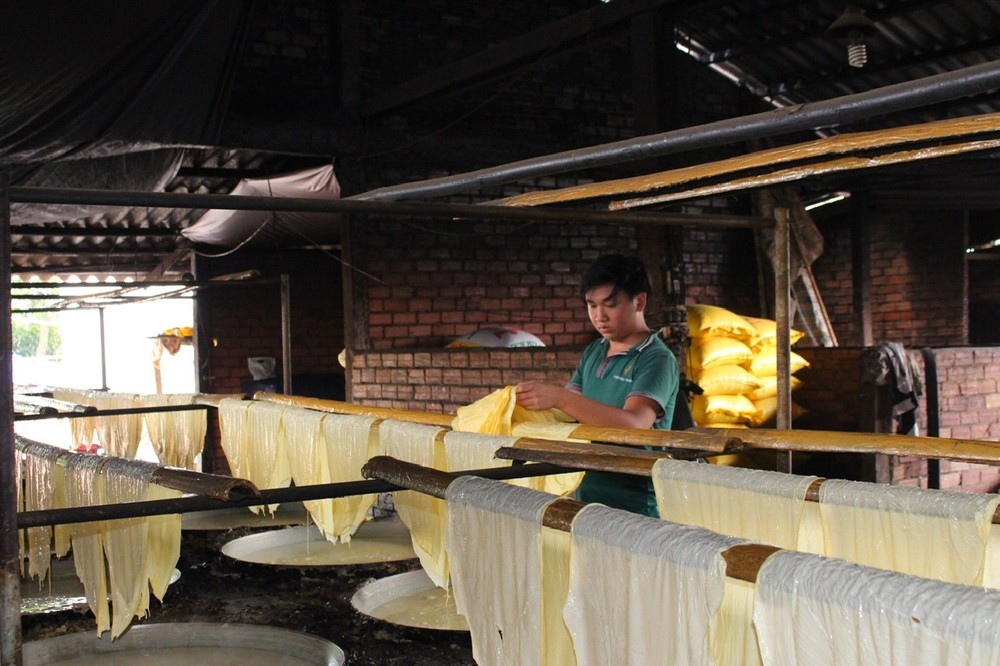
Robust demand for OCOP specialties
Presently, numerous specialties from the Mekong Delta region are actively involved in the One Commune One Product (OCOP) Program. Following the recognition and OCOP certification of these specialties, there is a notable revenue increase of about 10-30 percent, and product prices also experience a rise of 10-20 percent. This contributes significantly to generating employment and ensuring stable income for the workforce, particularly benefiting women in rural areas.
Pineapple is a primary crop in the alkaline soil of Tan Phuoc District in Tien Giang Province. Pineapple not only serves as a key agricultural product contributing to the economic development of the locals, enabling them to prosper, but it also adds a unique sweet flavor to the local delicacies, especially the distinct pineapple candies from this alkali-rich region.
Pham Thi Bich Ngoc, the owner of the Tan Phuoc pineapple candy production facility in Phuoc Lap Commune, Tan Phuoc District, Tien Giang Province, explains that pineapple candy is crafted from ingredients such as ripe pineapple, peanuts, sesame seeds, ginger, and sugar. All these elements blend harmoniously in suitable proportions. However, to create a batch of delicious pineapple candy, skilled craftsmanship is essential, involving meticulous and precise techniques, particularly during the challenging stir-frying stage. This step requires careful temperature control to ensure the candy's elasticity and fragrance.
On average, Ngoc's facility produces around 50kg of pineapple candy daily. During the Tet season, the production surges five to six times to meet the increased demand. Presently, pineapple candy is priced at approximately VND90,000 per kilogram, depending on type. It is noteworthy that pineapple candy is a signature product of Tan Phuoc District and has received official OCOP certification.
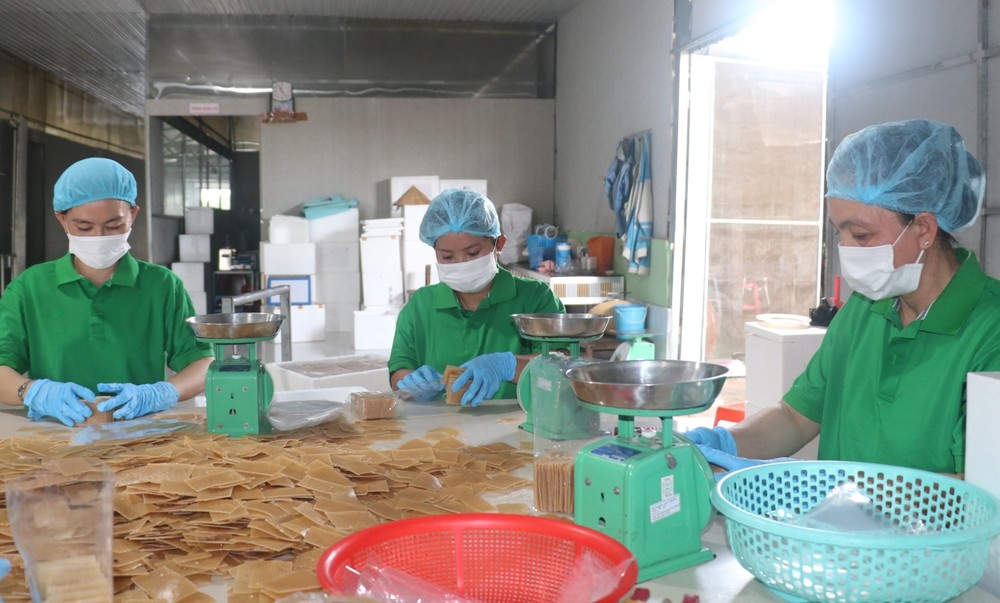
Mr. Mai Sau, Director of Vinh Hoa Phat Import-Export Joint Stock Company in Hang Vinh Commune, Nam Can District, Ca Mau Province, mentioned that over the past times, there has been strong demand for shrimp crackers produced by the craft village of Hang Vinh, especially during the Lunar New Year. Numerous shrimp cracker products from this craft village have actively participated in the OCOP program.
"Currently, our shrimp cracker product at Vinh Hoa Phat has been upgraded from a 3-star to a 4-star rating. Meeting the OCOP standards has not only improved the design and quality of the product but has also enhanced the distribution channels. As a result, the product has gained more recognition and increased sales. The production volume has consequently risen by 10-20 percent, providing stable employment for over 20 workers," further informed Mr. Mai Sau.
Mr. Duong Vu Nam, Deputy Director of the Department of Industry and Trade of Ca Mau Province, reported that for the 2024 Lunar New Year, local businesses have stockpiled goods worth over VND1 trillion. This includes over VND112 billion for the food and agricultural products group, over VND354 billion for the food technology group, and over VND28 billion for the group comprising OCOP products, typical rural industrial products, and specialties of Ca Mau Province.
According to Mr. Nam, the market for Tet goods is expected to remain relatively stable, with prices experiencing minimal fluctuations compared to regular days. The purchasing power during the Lunar New Year is anticipated to increase by approximately 5-10 percent compared to regular days and is not projected to rise significantly compared to the 2023 Lunar New Year.

